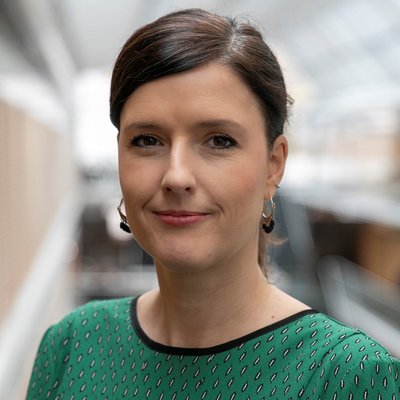Univ.-Prof. Esther Blanco

- 2 Besuche pro Semester
- Bevorzugte Regionen: Tirol
- Besuche nur auf Englisch möglich!
- Besucht gerne folgende Schulstufen: Volksschulen, SEK I, SEK II, Sonderschulen und inklusive Schulzentren
- Keine anfallenden Kosten für die Schule
Forschungsschwerpunkte
- Environmental Economics
- Experimental Economics
- Behavioral Economics
- Public Economics
Aktuelle Projekte
APCC Assessment Report on Climate Change in Austria: Ziel des AAR2 ist es, den Wissensstand zum Klimawandel in Österreich und seinen Folgen zu erheben sowie Vermeidungspotentiale und -strategien, Anpassungsmöglichkeiten und Transformationspfade aufzuzeigen. Wissenslücken sollen im Sinne einer klimaneutralen Gesellschaft geschlossen werden. Der Sachstandbericht wird im Sommer 2025 veröffentlicht. Das Projekt lehnt sich an die Prozesse des Weltklimarates an und ist für die Umsetzung des 13. SDG-Zieles relevant.
Credence Goods, Incentives, and Behavior – Theory, Lab, and Field: The project’s aim is to analyze key determinants of individual behavior and market performance in credence goods markets with a variety of methods, combining theoretical work, laboratory experiments and field experiments. The research group consists of more than 30 scholars from economics and finance, thus bridging research across both fields.
Providing Ecosystem Services When Outsiders Support Insiders: This project investigates the cooperation of two groups. The difference between the two groups is that the first group (we call them insiders) can take actions that benefit both groups. We call these prosocial actions that provide a public good. The second group (we call them outsiders) cannot take such actions. However, they can help the insiders by subsidizing their prosocial actions. For example, those who do not live or own land in a forest ecosystem (the outsiders), cannot directly make decisions on the status of the ecosystem. Only those who live in the forest (the insiders) can take actions to maintain or improve the ecosystem. Yet, the outsiders can still benefit from the public goods of biodiversity conservation, climate protection or watershed management that the forest generates. So, the outsiders could subsidize the insiders to take actions that improve the ecosystem.
Thematischer Workshop
Cooperation for Climate Action: Climate action is a social dilemma whereby there are so-called “free-riding” incentives, tempting people to benefit from the effort of others while not contributing (much) themselves. The opposite strategy, devoting costly efforts towards scenarios that are welfare-enhancing is usually referred to in economics as cooperation. Cooperation for climate action has been studied through variations of public goods games. A common finding of this literature is that while some people cooperate and try initially to enhance social welfare for the group, others take advantage of their efforts and undermine the willingness to cooperate. In the absence of social norms, institutions, or changes in the incentive structure, cooperation is fragile and its maintenance in groups should not be taken for granted.
At the same time, cooperation for climate action is an essential strategy to mitigate emissions in advancing towards climate neutrality, as best illustrated by the new chapter 5 “Demand, services and social aspects of mitigation” on the latest IPCC report, and similar efforts currently ongoing for example as part of the chapter “Navigating demand-side transformations towards net-zero” of the 2nd Austrian Assessment Report of Climate Change, of which Prof. Blanco is Coordinating Lead Author. As part of the policy pluralism needed for the bold and transformative steps to shift the world onto a sustainable and resilient path, fostering cooperation for climate can unleash cascading effects for widespread behavioral change.
Zielgruppe: AHS (SEK I und SEK II)
Dauer: 12 UE
Ort: in der Schule oder online
Auszug aus dem wissenschaftlichen Werdegang
My research addresses the influence of institutions on cooperative behavior in fostering greener, fairer, knowledge-based societies. My current research builds mainly on multi-method studies coupling evidence from field experiments with complementary data from questionnaires, surveys, interviews and secondary data to assess the robustness and external validity of findings.
The scientific contributions of my previous research revolve around three topics: First, I have developed new paradigms in experimental games to incorporate real-life complexity from conservation decisions. Specifically, including probabilistic damages, analyzing the strategic interaction of mitigation and adaptation decisions and incorporating donors in payments for ecosystem services. Second, I have pushed the methodological and knowledge boundaries on the interrelation between local governance of natural resources and pro-social and anti-social preferences. Studies in this line of research use multi-method, multi-disciplinary research approaches with participants in lower income countries. Third, I have provided theoretical and experimental evidence on the interaction between firms’ certified and uncertified green claims in settings where there is scope for fraud, advancing our understanding on corporate social responsibility. My research informs policy design fostering greener, fairer, societies, pursuing the objectives of the Climate Change Paris Agreement, the EU Biodiversity Strategy for 2030, the EU Green Deal, and the UN Sustainable Development Goals.
I lead large research conglomerates advancing the frontier of knowledge on how to alleviate social dilemmas. I contribute to the scientific community of the Ostrom Workshop (https://ostromworkshop.indiana.edu/), co-funded by Nobel Prize Winner Elinor Ostrom, strengthening the research on commons and governance. I am Deputy Director of the research area Economics, Politics and Society (https://www.uibk.ac.at/en/epos/) at the University of Innsbruck, conglomerating the research conducted by more than 400 researchers in economics, finance, management, political science, sociology, education, psychology and statistics. I am also co-PI of the Special Research Program on Credence Goods, Incentives and Behavior, competitively funded by the Austrian Research Fund (~4 million Euros, 2021-2025), whereby we consolidated a team of roughly 20 researchers (https://www.uibk.ac.at/credence-goods/). And I have the honor to serve as Coordinating Lead Author of the APCC Assessment Report on Climate Change in Austria (~2 million Euros, 2022- 2025), competitively funded by the Climate and Energy Fund, with a team of over 120 researchers (https://ccca.ac.at/wissenstransfer/apcc/aar2).
